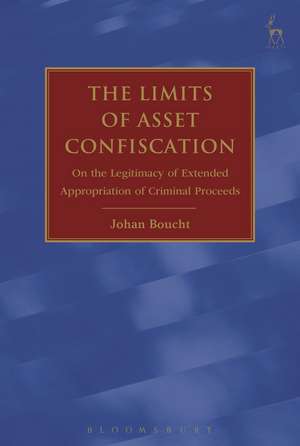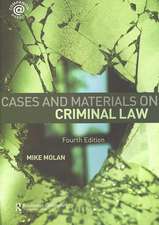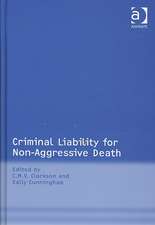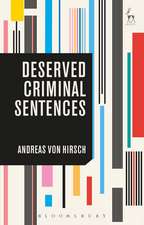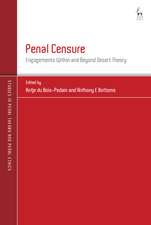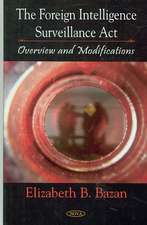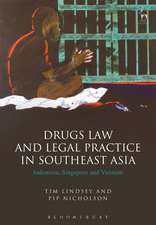The Limits of Asset Confiscation: On the Legitimacy of Extended Appropriation of Criminal Proceeds
Autor Dr Johan Bouchten Limba Engleză Paperback – 30 oct 2019
| Toate formatele și edițiile | Preț | Express |
|---|---|---|
| Paperback (1) | 319.31 lei 6-8 săpt. | |
| Bloomsbury Publishing – 30 oct 2019 | 319.31 lei 6-8 săpt. | |
| Hardback (1) | 716.00 lei 6-8 săpt. | |
| Bloomsbury Publishing – 31 mai 2017 | 716.00 lei 6-8 săpt. |
Preț: 319.31 lei
Preț vechi: 390.88 lei
-18% Nou
Puncte Express: 479
Preț estimativ în valută:
61.10€ • 65.34$ • 50.94£
61.10€ • 65.34$ • 50.94£
Carte tipărită la comandă
Livrare economică 17 aprilie-01 mai
Preluare comenzi: 021 569.72.76
Specificații
ISBN-13: 9781509933044
ISBN-10: 1509933042
Pagini: 280
Dimensiuni: 156 x 234 x 22 mm
Greutate: 0.4 kg
Editura: Bloomsbury Publishing
Colecția Hart Publishing
Locul publicării:London, United Kingdom
ISBN-10: 1509933042
Pagini: 280
Dimensiuni: 156 x 234 x 22 mm
Greutate: 0.4 kg
Editura: Bloomsbury Publishing
Colecția Hart Publishing
Locul publicării:London, United Kingdom
Caracteristici
An original and important normative assessment of the rules governing asset confiscation in the criminal law of the UK, Scandinavia and the EU.
Notă biografică
Johan Boucht is Professor of Criminal Law at the University of Oslo, Norway. He has a law degree from the University of Helsinki, Finland, and obtained his doctorate from Uppsala University, Sweden.
Cuprins
1. Introduction I. The Rise of Extended Appropriation as a Criminal Policy Measure II. Extended Asset Appropriation and other Forms of Confiscation III. A Note on Terminology IV. A Note on Methodology V. Delimitations VI. Outline of the Book 2. Extended Criminal Confiscation I. The Principal Features of Extended Criminal Confiscation II. Extended Criminal Confiscation in the EUIII. Criminal Confiscation in Norway and Sweden IV. Criminal Confiscation in England and Wales V. Summing Up the Comparison 3. Non-Conviction Based Asset Confiscation I. The Principal Features of Non-Conviction Based Confiscation II. Non-Conviction Based Confiscation in England and Wales, Ireland and the EU 4. Justifying Asset Confiscation I. Introduction II. Justifying Extended Appropriation III. The Legal Nature of Extended Asset Appropriation 5. Towards a Normative Framework for Assessing Extended Asset Appropriation I. Exploring the Limits of Extended Asset Appropriation II. Extended Criminal Confiscation: The Target Area III. Quantification of Extended Criminal Confiscation Orders-Should Substantive Proportionality Be Required? IV. Extended Criminal Confiscation: Procedural Safeguards V. Non-Conviction Based Confiscation: The Target Area VI. Quantification of Non-Conviction Based Confiscation Orders-Should Substantive Proportionality be Required? VII. Non-Conviction Based Confiscation: Procedural Safeguards 6. Curtain: Assessing the Feasibility of Extended Appropriation
Recenzii
The Limits of Asset Confiscation is an insightful, well-researched book that is well worth reading for anyone with an interest in confiscation laws. It is clearly a result of considerable effort and has the merit of introducing clarity and structure into what can be a daunting area of law.
The book contains a descriptive chapter on the rules on extended criminal confiscation in the EU, Norway, Sweden, England and Wales. Also rules on NCB confiscation are described. This account is informative. However, even more interesting and rewarding are the chapters on the reasons for introducing schemes on extended appropriation and the normative framework surrounding them. These sections are analytical, normative, and legal-dogmatic. You can read them with thoughtfulness and be well-rewarded by the discussion. (Translated from the original Swedish)
The book contains a descriptive chapter on the rules on extended criminal confiscation in the EU, Norway, Sweden, England and Wales. Also rules on NCB confiscation are described. This account is informative. However, even more interesting and rewarding are the chapters on the reasons for introducing schemes on extended appropriation and the normative framework surrounding them. These sections are analytical, normative, and legal-dogmatic. You can read them with thoughtfulness and be well-rewarded by the discussion. (Translated from the original Swedish)
